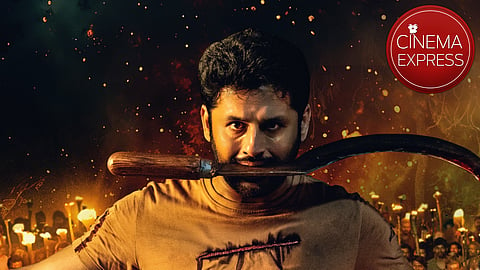Thammudu movie review: A frustrating action drama trapped in textbook emotions
Thammudu movie review(1.5 / 5)
There are moments in Thammudu where a kid with a heart condition is held hostage, a pregnant woman is in labour, a tribal daredevil female bus driver plays retro Chiranjeevi songs, and a strict government officer refuses to sign a document that could save everyone. At those points, you don’t ask questions. You just surrender. Not to the film’s stakes or storytelling, but to the sheer absurdity of how much noise a film can make while saying absolutely nothing.
There’s a saying that a film doesn’t need to be original, just honest. But Thammudu borrows its blueprint from Kaithi, rewrites it with soap-opera ink, and then proudly parades it as a new content-driven concept. It tries to juggle a dozen themes, familial redemption, tribal mysticism, corporate crime, radio romance, and a tepid brother-sister bond, but fails to give honest emotional weight to even one of them.
Director: Venu Sriram
Cast: Nithiin, Sapthami Gowda, Varsha Bollamma, Swasika Vijay, Laya, Saurabh Sachdeva
Nithiin plays Jay, a guilt-ridden archer who froze out his sister Snehalatha (Laya) years ago, who was forced by their family to marry against her choice. She left the family, joined the civil services, and now finds herself at the centre of a cover-up involving a deadly factory blast. She refuses to sign a falsified report for the corrupt owner (Saurabh Sachdeva), and the villain retaliates by threatening her entire family during a tribal jathara in Ambaragodugu. Jay happens to cross paths with them in the middle of the road (literally) and decides this is his big shot at redemption. What follows is a never-ending series of attacks, threats, melodramatic monologues and action sequences.
The film has some interesting ideas, for sure. A tribal village with no law and order. A woman who runs a community radio station that becomes a lifeline. A villain who suffers from a rare condition that makes him fatally allergic to sounds above 20 db. A bus driver named Gutthi (played with some flair by Swasika Vijay) who plays retro songs and agrees to a risky rescue mission. But these ideas float around like disconnected islands, never forming a coherent landscape. Each plot thread exists in its own bubble, showing up for a scene or two before being forgotten, underused, or worse, milked for fake emotional beats.
Let’s talk about “emotions”. This film markets itself as a brother-sister emotional saga. But the problem is not just that the emotions are melodramatic, it’s that they are entirely unearned. Nithiin’s Jay remembers his sister after what seems like years, has a sudden pang of conscience and decides to risk life and limb for her family. The audience is expected to accept this whiplash transformation without context. We’re shown no build-up, no real sense of regret, no lived-in guilt. Just one quick flashback, a sudden realisation, and voila, he’s now Arjuna in this save-the-cat screenplay.
The rest of the family? They exist to be repeatedly assaulted, chased, stabbed, or weep in fear. A pregnant woman goes into labour, a child’s heart condition flares up, and even then, Laya’s Snehalatha refuses to sign the villain’s forged report because, well, “Dharma.” At some point, you genuinely want to shake her and say, “Ma’am, your entire family is traumatised. Please just sign the bloody thing and write an exposé later.” But alas, the film prefers clinging to its cardboard morals like a child to an expired lollipop.
The action, which should have been the spine of such a one-night thriller, is generically choreographed, emotionally void and logically, let’s not even go there. Nithiin fights off wave after wave of faceless goons with the same sleepy-eyed expression he has used for half a decade now. The stakes never escalate, the tension plateaus early, and as the climax arrives closer, the film moves a decade back until it finally ends on a 60s note.
The biggest crime, though, is the film’s sound design and music. Ajaneesh Loknath, the repeat offender, seems to have this steadfast belief that louder means better, which unfortunately works only if the storytelling matches the intensity. Here, the soundtrack shifts violently from sentimental cues to bombastic tribal chants to screeching action scores, often within the same scene. It’s as if someone is shuffling songs from different playlists every ten seconds with no transition or warning. At some point, you start wishing for the villain’s sound-reduction earplugs.
On top of these, the film’s use of mythology and folklore is pretentious. Random people name-drop Dharmaraju or Arjuna without context, as if to plug a gap in logic and purpose with divine nostalgia. This lazy co-opting of epics to mask storytelling failure is getting increasingly tiresome in Telugu cinema. It’s not reverence, it’s exploiting people’s cultural sentiments to score an easy high. But the truth is, the trick is wearing down its impact.
If anything redeems this film, it is in fleeting ideas like the villainous Guththi, the radio host Ratna or the sound-phobic villain. But those are exceptions in a film that feels like it was reverse-engineered from a checklist of trends. Action film? Check. Family emotion? Check. Mythological reference? Check. Redemption arc? Check. What it misses to check is the core of all good cinema... storytelling with soul.
Thammudu is not just a misfire. It is a glaring reminder that it is not going to work for makers if they just borrow formulas, stack folklore, and rely on noise over nuance, when they forget to do the one thing the audience needs, that is, make them feel something.

